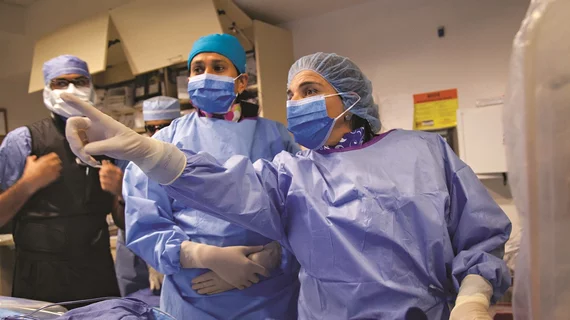Two viewpoint pieces published May 30 in JAMA Cardiology focused on the inequities women face in cardiology, both in terms of compensation and discrimination.
Rashmee U. Shah, MD, MS, with the University of Utah School of Medicine, estimated women cardiologists earn an average of $2.5 million less than their male counterparts over the course of a 35-year career. This is a result of lower starting salaries and, therefore, less income to invest over the course of their careers, even if both genders receive equal yearly raises when calculated as a percentage of their salary.
“Prior research suggests that productivity (e.g., number of publications and Medicare billing) does not account for the wage disparity,” Shah wrote. “In addition, the argument for seniority and less productivity among women is untenable at the time of hiring because neither men nor women have had time to accumulate accolades; this initial inequity is what propagates over time.”
Shah said the wage gap may be even worse in academic settings, where it has been demonstrated that women receive less money for research start-ups than men. This can contribute to another measurable disadvantage that compounds over time, she said, and result in fewer publications and academic grants, which affect compensation.
“Women and men must rally together to make the workplace fair, more productive, and better for everyone,” Shah concluded. “Rather than place the burden solely on women to change the status quo, the predominantly male leadership needs to assume responsibility by creating a system that measures the value provided to the organization in a uniform, transparent way. In the words of Lindy West, ‘We did not install this glass ceiling, and it is not our responsibility to demolish it.’”
In the other article, Roxana Mehran, MD, with Icahn School of Medicine at Mount Sinai, New York, expressed disappointment that the sessions on diversity in cardiology at the 2017 Transcatheter Cardiovascular Therapeutics (TCT) scientific meeting were sparsely attended. Diversity was, in fact, the theme of the meeting for the first time in its 29-year history.
But one interaction from a diversity session stuck with Mehran, who was a course director at the conference. A fellow took the microphone and described her interview process for an interventional cardiology fellowship program, during which she was asked about “her so-called biological clock and questioned whether she was serious about becoming a practicing interventional cardiologist.”
“Seated in the back of the room, I didn’t feel uncomfortable. I felt outraged,” wrote Mehran, who said she was asked the same question in her own job interview in 1995. “I realized that the rocky roads up the mountains we had climbed and tried to pave behind us were not paved at all; in fact, they are covered by mud in which others continue to sink.”
Citing previous research, Mehran said more than 60 percent of female cardiologists report having experienced sex-based discrimination. Her own anecdotal evidence backs that up.
“I do not know of a single woman who has trained in cardiology and chosen interventional cardiology as her career who has not faced some level of sexual harassment or misconduct,” she wrote. “This is not hyperbole. Women have been underrepresented, underestimated and undervalued for many long years.”
Mehran called on her peers to follow the example of the fellow at TCT and use their voices to illuminate the injustices they’ve faced. Hopefully, she said, this will spur change.
“Rather than make excuses or nod sympathetically, leaders must do something in response to these voices—even if it makes them uncomfortable,” Mehran wrote. “We all must act.”

